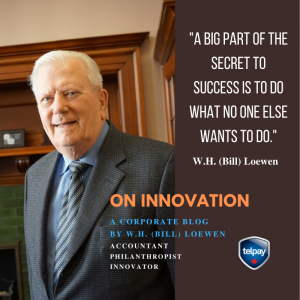 In the early days of the computer era, there were lots of predictions about where these new devices would lead us. Many are memorable because they were wrong. Someone wrote a book titled “The End of Work”. For some of us that don’t seem to have worked.
In the early days of the computer era, there were lots of predictions about where these new devices would lead us. Many are memorable because they were wrong. Someone wrote a book titled “The End of Work”. For some of us that don’t seem to have worked.
Comcheq drew predictions from others in the computer services businesses. There was no way Comcheq was supposed to be able to survive with the banks as its competitor. We were viewed as the garbage collectors of the computer industry because we provided a service no one else wanted to. But survive we did and eventually thrived because the banks who provided other types of services disappeared long before Comcheq was sold to CIBC.
A big part of the secret to success is to do what no one else wants to do. It turned out that even the banks found out that they didn’t want to do payrolls and for a couple of reasons: it interfered with their processing of their banking information and it took too much of their programming resources to maintain their system
A second key factor is to know what you are doing. Having first-hand experience in the whole cycle of the payroll operation, week by week, year by year, was instrumental. I wasn’t guessing at what customers needed. A third component necessary for success is the willingness to learn. I also learned to listen to the customer when I lost one of our first customers for not doing so. There were endless variations in customer’s needs that could be satisfied once you had the data needed to do it.
I spent a lot of time listening to customers and to employees that had listened to customers. I developed a rule that if I heard a request once, I would make a note. If I heard it twice, I looked for a solution.
Eventually, the banks were the only significant competitors and, in spite of the fact that they had thousands of branch managers who already had contact with our prospects and many had income or bonuses tied to their performance, we found our place among them. At first, we were most successful with the more difficult payrolls. Eventually, our level of service was so superior and the bank systems were creating so many difficulties for important bank customers that some branch managers were recommending Comcheq’s service rather than there own.
I have great respect for bank managers. With very rare exceptions I have found them to be honourable people. Their word over the phone that they would honour their customer’s cheque was always as good as gold. Head office, not so much! I guess it’s more of dog eat dog there. One never met a female bank manager in those days. As for senior management and directors, we had to take Royal Bank President Mulholland’s word that there were no women capable of holding a bank directorate. I wonder how that would go over today!
Within about eight months of starting Comcheq, I became aware that the banks were to be our competition. That fear was soon confirmed. Andy Stevens, a Comcheq director, was on the Board of the University of Winnipeg. He had convinced their administration to use Comcheq’s services. On the Board also was an employee of CIBC who apparently advised them not to accept Comcheq’s services because Comcheq would not last. Anyway, CIBC would be providing that service the next spring. The university decided to take CIBC’s offer. Neil Wood of Fidelity Trust sent a strong letter to CIBC and an apology was soon forthcoming. But we didn’t get the payroll. That was the beginning of my experience as a competitor to banks.
